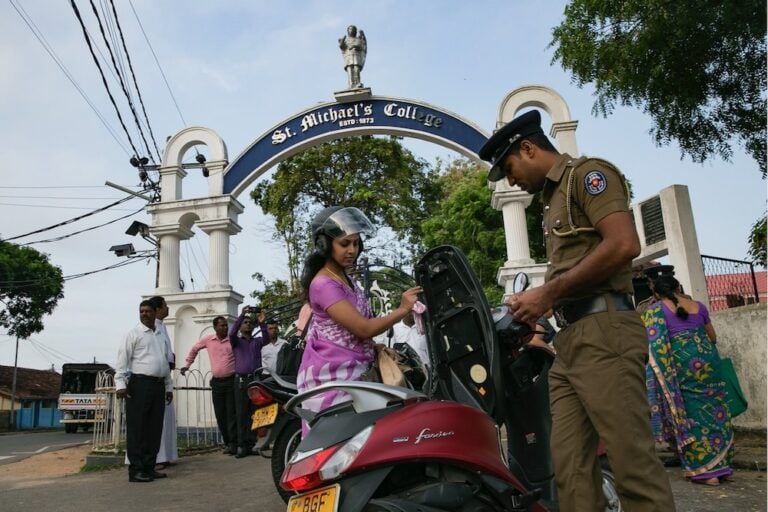(FMM/IFEX) – The following is an abridged version of a 1 June 2007 FMM media release: On parliamentary privilege and media freedom The Free Media Movement (FMM) expresses surprise and dismay at the statement issued by the United National Party (UNP) in response to FMM’s statement concerning the remarks made by the leader of the […]
(FMM/IFEX) – The following is an abridged version of a 1 June 2007 FMM media release:
On parliamentary privilege and media freedom
The Free Media Movement (FMM) expresses surprise and dismay at the statement issued by the United National Party (UNP) in response to FMM’s statement concerning the remarks made by the leader of the opposition, Ranil Wickremasinghe, alleging a breach of parliamentary privilege by sections of the media. In the view of the UNP, some media institutions had not reported on or failed to give sufficient publicity to, a critical speech in Parliament by chief government whip Jeyaraj Fernandopulle regarding security arrangements for former president Kumaratunga. According to the UNP statement, its enquiries in this regard revealed that the failure to report Mr Fernandopulle’s speech on the part of some media institutions was prompted by fears of a contempt of court charge, given that the security arrangements had been the subject of litigation before the Supreme Court recently. Mr. Wickremasinghe’s speech in Parliament and the UNP’s subsequent statement take the position that the media’s failure to report the speech constitutes a breach of parliamentary privilege and that, accordingly, the concerned institutions should be summoned before the Committee on Privileges to be called to account and presumably, punished.
FMM is concerned that the UNP, in its statement, has confused the fundamental purpose of parliamentary privilege – which is to protect individual members from legal action as well as collectively enable Parliament to discharge its constitutional function – with modern practice relating to media coverage of parliamentary debates and proceedings. While the UNP is justified in asserting the rights of Parliament, especially in relation to contempt of court, parliamentary privilege does not, and in a democracy cannot, regulate the media or seek to dictate editorial content and policy in relation to parliamentary proceedings or otherwise.
Indeed, it would be inconceivable in the United Kingdom or in any other parliamentary democracy for the kind of measure the UNP proposes to be treated with any seriousness. A free and vibrant media and Parliament, and especially the opposition, have central roles in a functioning democracy. These roles are best served if Parliament respects the domain and independence of the media. The UNP’s reference in this regard to the Editor’s Guild Code of Ethics, which is for the best public policy reasons a self-regulating code, is irrelevant as its enforcement is not the concern of Parliament or of any political party. Means and mechanisms of ensuring compliance with the Code are set out in the Code itself.
That certain media institutions have felt constrained in reporting the comments of the government chief whip therefore indicate not some specious breach of parliamentary privilege, but a wider challenge to freedom of expression and the independence of the media as protected by the laws relating to contempt of court in Sri Lanka. Unlike other modern democracies, including the United Kingdom, the law relating to contempt of court is not statutorily regulated in Sri Lanka. The consequence has been an arbitrary and unrestrained use of contempt powers by the courts. It is particularly remarkable in this context that the UNP wishes to further exacerbate this environment with its threat to use parliamentary privilege to secure media coverage to its own liking.
In order to promote and secure the enjoyment of the freedom of expression and other fundamental human rights by the people of Sri Lanka, FMM hopes that the honourable leader of the opposition and the UNP as the principal parliamentary opposition will commit forthwith to the following reforms, and seek to ensure their expeditious entry into the statute book:
– Enact legislation to enable live broadcasting and telecasting of debates and proceedings of the House and its committees, except where confidentiality is required and in line with international best practices;
– Repeal the provisions of the Parliament (Powers and Privileges) Act No. 21 of 1956 (as amended) relating to punishment by Parliament for breach of privilege and contempt so as to bring Sri Lankan law in line with modern practices of legislative bodies;
– Enact a Contempt of Court Act in line with international best practices and consistent with freedom of expression and other fundamental rights so as to confine, structure and regulate the use of judicial contempt powers;
– Enact a Freedom of Information Act to secure access to official information.


